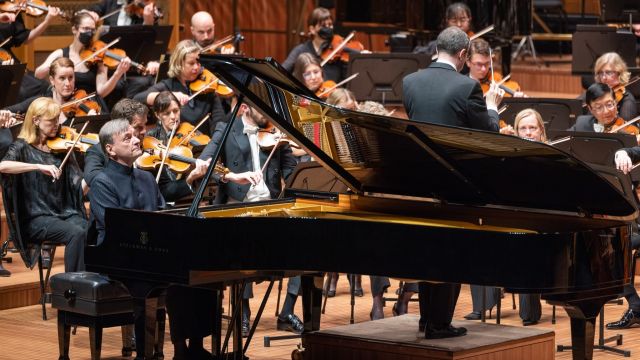Stephen Hough Performs Rachmaninov 1
Stephen Hough is an impressive polymath, a great pianist, but also a composer, an author, a music advocate and educator at top British academies, and last year, a knighthood – and he’s an Australian citizen.
He’s performing all the Rachmaninov Concertos next year in Australia. For this program, he’s taken on the composer’s first concerto, which was much applauded in Moscow when Rachmaninov wrote it while still a teenage student. He reworked it 26 year later in 1917 as the Bolsheviks took over the streets outside. Finally happy with his revision, he and his family escaped revolutionary Russia before the year’s end, eventually settling in the US.
Rachmaninov’s fiery first movement has all the youthful impulsiveness from his original concerto; it’s fresh, Russian and unapologetically Romantic. In a lengthy showpiece cadenza, lunging down the octaves, Hough’s pounds the bass and twinkles the highs, balancing drama with exquisite detail. Later he drives a keen, playful dialogue between piano and the full Sydney Symphony Orchestra, under guest conductor John Wilson, retreating at times to a ravishing pianism of simple lyrism.
Rachmaninov remained in the late Romantic tradition much like his mentor Tchaikovsky, but Liszt and Chopin were also firm influences, as Hough’s sensitive playing reminds us. After the concerto’s celebratory finale, and the applause, Hough returned to play, so appropriately, a swooning Chopin nocturne.
As for Rachmaninov, all these luxurious harmonies, plush lyricisms and virtuosic piano in the old bravura tradition seemed irrelevant in twentieth century America. Frustrated by his musical rejection, he died in Beverly Hills in 1943.

Composer Erich Wolfgang Korngold was, like Rachmaninov, also somewhat of a child prodigy, born into a Jewish family in what is now the Czech Republic. Escaping the Nazis, he too immigrated to the US where he also struggled for creative happiness, despite being celebrated as a film composer in Hollywood.
John Wilson, who has done much to revive interest in Korngold’s concert music, said he died a broken man because it went unperformed, especially his only Symphony (in F-Sharp) completed in 1952, five years before his death.
It’s a four-movement kaleidoscope of short melodies and intense dramas. The symphony’s power – and this won’t make Korngold any happier – lies in the many abstract scenes and moods it evokes derived from 20thCentury cinema, especially the last movement which draws on his own film scores. Wilson delivers a fast rhapsodic concert, from the stormy, fractured first movement, but only in the third, more meditative reflection does Korngold rise above this rush of musical grabs – and suggestion of anger beneath – and touch my empathy.
Hough, Rachmaninov and Wilson are the stars, along with the Sydney Symphony Orchestra.
Their work is proceeded by a stirring, smartly accented fanfare – a world premiere – by Gordon Hamilton, which makes for a grand start.
Martin Portus
Photographer: Craig Abercrombie
Subscribe to our E-Newsletter, buy our latest print edition or find a Performing Arts book at Book Nook.

